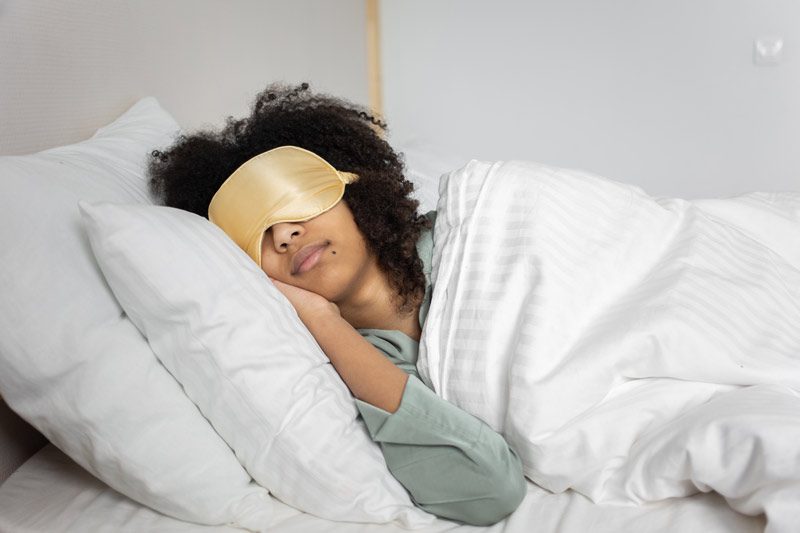Melatonin is a hormone produced in the pineal gland, a pea-sized gland close to the center of your cerebral cortex. It assists your body in determining when it’s time to rest and when it’s time to wake.
The body normally produces more melatonin during the night, and it is common for levels to increase after the sun goes down. When the sun rises in the morning, melatonin levels fall. Your body clock and the amount of sunlight you are exposed to each day determine how much your body produces.
Melatonin is also available in supplements, such as tablets, liquids, and sleep melatonin gummies. You can find them in synthetic or natural versions. The natural variety are made from the pineal gland of animals.
Melatonin to sleep better?
Your brain releases the hormone melatonin in reaction to darkness, which aids in sleep and the timing of your circadian rhythms (24-hour internal clock). Light exposure at night can prevent the generation of melatonin.
Researchers believe that melatonin has more functions than just promoting sleep. These effects are not entirely understood, though.
Melatonin can be produced by animals or microbes, but synthetic production is more common. The following information is about melatonin nutritional supplements.
How does melatonin work?
Scientists are only beginning to understand how well melatonin supplements treat certain sleep issues and when and how much is best to consume. We do know that short-term melatonin administration for days or weeks is superior to a placebo for treating sleep-onset insomnia (trouble falling asleep at first).
If your circadian cycles are off, taking melatonin tablets may help you sleep better. Melatonin may also be beneficial if you tend to be a “night owl” and are more productive and aware in the evening or at night.
Taking melatonin for jet lag?
Treating jet lag is another of melatonin’s benefits. Melatonin has been extensively researched as a sleep aid in jet lag therapy, and it is now a widely recognized component of successful jet lag treatment. Recent studies appear to support the theory that melatonin promotes sleep during hours when you wouldn’t typically be sleeping, which makes it useful for people who experience jet lag.
How much melatonin do you need?
Melatonin supplements may not work for everyone. For supplements to be effective, it’s crucial to adjust your dosage, intake method, and time of day depending on the nature of your particular sleep issue. It’s possible that taking it at the wrong hour will worsen your sleep disorder.
It’s advisable to begin with melatonin in very small dosages. When administering the dose, try to stay near your body’s usual production rate—less than 0.3 mg a day. You should use the smallest amount to get the intended result.
It’s best to seek medical advice when using melatonin. Based on your diagnosis and sleep history, your doctor may recommend a different melatonin dosage, depending on how it works for you. It’s best to contact a sleep specialist for chronic issues like insomnia or other sleep disorders to receive a proper diagnosis and discuss cognitive behavioral therapy or other therapies. The ideal melatonin dosage should result in comfortable sleep without any grogginess or weariness during the day.
Best time to take melatonin
The best time to take melatonin for sleep is two hours before bed. Starting a few days before a trip, think about taking melatonin two hours before bed to help with jet lag. By staying up when you arrive at your destination and postponing sleep until your regular bedtime in the new time zone, you may also alter your sleep-wake cycle to sync with your new destination. Go outside as well for exposure to natural light.
Is it safe to use melatonin?
There currently is not enough data on the potential adverse effects of melatonin supplements, especially at levels higher than what the body produces naturally, to draw a firm conclusion regarding their general safety. For most people, using melatonin supplements for a short period seems to be safe, although there is insufficient research on the long-term safety of doing so.
As with any dietary supplement, those taking medication should speak with their doctor before using melatonin supplements. The use of supplements should be closely monitored by a physician, especially for individuals with epilepsy and anyone using blood thinners.
In the United States, melatonin is regarded as a nutritional supplement. This means that it is subject to less rigorous FDA regulation than would be the case for a prescribed or over-the-counter medicine. In some other nations, melatonin is regarded as a drug and is only accessible with a prescription.
Tips to Consider
Keep in mind that although the FDA monitors dietary supplements such as sleep melatonin gummies, the rules for dietary supplements differ from and are less stringent than those for pharmaceutical or over-the-counter medicines.
Some nutritional supplements can interfere with medications, be dangerous if you have health issues, or even put upcoming surgeries at risk.
It’s especially crucial to consult your doctor before using any medication or dietary supplement, including melatonin, if you’re expecting or breastfeeding a baby.
About the Author: I am Nakshatra Nair, with Bachelor’s and Master’s degrees, and an inquisitive person who loves writing. I’m working in digital marketing and everything that has to do with laptops and screens. I am someone who believes that one person can make a change, and that’s precisely why I took up writing, which is the best tool to communicate these days. I have a decade of experience in content writing and marketing, and I still find myself learning new things about it, which I want to share with my readers. I write content for nidranutrition.com, marketers of Ashwagandha supplements and sleep gummies.
Photo by EKATERINA BOLOVTSOVA: https://www.pexels.com/photo/a-woman-sleeping-on-the-bed-7445175/
The opinions and views expressed in any guest blog post do not necessarily reflect those of www.rtor.org or its sponsor, Laurel House, Inc. The author and www.rtor.org have no affiliations with any products or services mentioned in the article or linked to therein. Guest Authors may have affiliations to products mentioned or linked to in their author bios.





